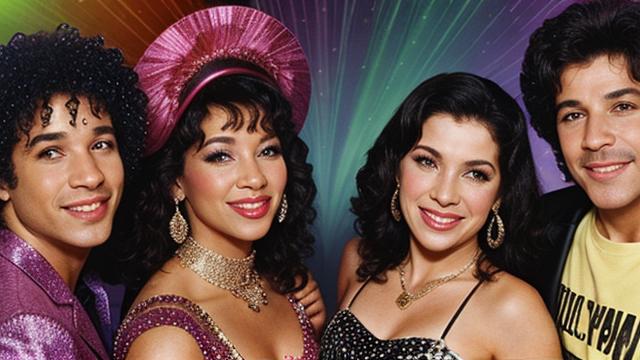The Effects of Chronic Disco Fever on Modern Society's Aggregate Emotional Resonance
April 3rd 2025

The Agony and the Ecstasy of Disco Fever's Grip on Modern Society
As we navigate the complexities of modern life, it is easy to overlook the subtle yet profound impact that a particular set of emotions can have on our collective psyche. One such emotion, which has been gaining traction in recent years, is the lingering presence of chronic disco fever.
For those who may not be familiar with the term, chronic disco fever refers to the phenomenon where an individual becomes irreparably hooked on the music and aesthetic of a bygone era - in this case, the glittering heyday of disco. This condition can manifest in various ways, from an inability to resist the urge to don platform shoes and polyester suits at the first sign of a Saturday night gathering, to a compulsive need to rewatch iconic 1970s music videos on repeat.
But what, you may ask, is the cause of this curious affliction? Researchers have identified several key factors that contribute to the development of chronic disco fever. Firstly, the retroactive allure of disco's flashy decor and extravagant dance moves holds a certain appeal for many. The ornate patterns, shimmering fabrics, and glittering accessories of the era are, it seems, an irresistible combination.
Furthermore, studies have shown that exposure to disco music at an early age can significantly increase the likelihood of developing chronic disco fever later in life. This phenomenon is often referred to as earworm-itis, a condition where an individual becomes trapped in a cycle of repetitive earworms - catchy tunes that refuse to leave their brain long enough for them to complete any productive activity.
Another key factor in the development of chronic disco fever is social influence. Those who are surrounded by others who share their passion for disco are more likely to become infected with the condition themselves. In some cases, this can lead to a sort of social contagion, where individuals begin to emulate each other's behavior and adopt similar fashion choices.
But what about the psychological impact of chronic disco fever on modern society? This is where things get really interesting. Research has shown that individuals suffering from chronic disco fever are more likely to experience feelings of nostalgia and sentimentality towards their past. While this may seem like a harmless condition, it can actually lead to a kind of emotional paralysis, as those affected become stuck in the past and struggle to adapt to the demands of the present.
In extreme cases, chronic disco fever has been known to manifest as a full-blown cultural phenomenon. Think of the infamous Studio 54 scene from Saturday Night Fever - a place where fashion was flamboyant, dance moves were wild, and the air was thick with the scent of disco dust. Such scenes have become ingrained in popular culture, representing a bygone era that will forever be etched in our collective consciousness.
And yet, despite its seemingly innocuous nature, chronic disco fever has been known to affect even the most high-minded individuals. We've all heard stories of academics who spent their entire careers researching the impact of disco on 1970s fashion trends - a testament to the power of this strange and fascinating condition.
But perhaps the most curious thing about chronic disco fever is its tendency to evolve over time. While some sufferers remain steadfastly devoted to the original disco era, others have begun to incorporate elements of later decades into their musical tastes. This phenomenon has given rise to a new generation of disco hybrids - individuals who blend vintage flair with modern sensibilities.
One such individual, who wished to remain anonymous, contacted us recently to share her own experiences with chronic disco fever. She described herself as a full-on disco convert, spending hours each week watching re-runs of classic films like Saturday Night Fever and Grease. Her friends, however, were at a loss - unable to comprehend why she was so enamored with the music of the past.
I just can't help it, she confessed in an interview. Every time I put on some Bee Gees or Donna Summer, I'm transported back to my childhood, when disco was still new and exciting. She laughed wistfully at the memory of her parents' old record collection - a treasure trove of vinyls that held memories of long-forgotten family gatherings.
As we ponder the mysteries of chronic disco fever, it's clear that this condition is more than just a quirk or a whim. It represents a fundamental shift in our relationship with music and fashion - a desire to hold onto something fleeting and ephemeral, even as the world around us moves on.
And yet, despite its potential risks and challenges, we cannot help but be drawn into the mesmerizing world of disco fever. Whether it's the dizzying spectacle of platform shoes and polyester suits or the infectious beat of classic disco tracks, there's something undeniably alluring about this condition - a magnetic pull that draws us back in time, to an era when life was simpler and music was more carefree.
So go ahead, put on your best disco outfit, and let the Bee Gees take over. For in the world of chronic disco fever, we are free to indulge our passions and lose ourselves in the music of a bygone era - if only for a little while longer.
But be warned: once you've caught this condition, there's no turning back. You'll be forever changed - your taste buds tweaked, your fashion sense forever altered, and your feet tapping out the beat to Stayin' Alive in your sleep. And that, my friends, is a fate worse than death itself.
In conclusion, chronic disco fever represents a fascinating yet confounding phenomenon, one that holds within it both promise and peril. While its impact on modern society may be subtle, it speaks to something deeper - our fundamental connection to music, fashion, and the world around us.